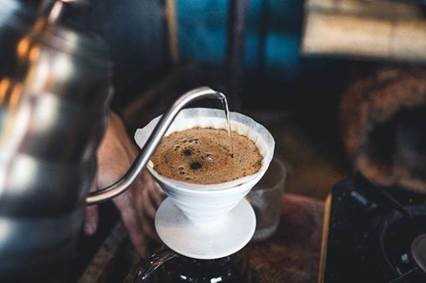VARGINHA, Brazil – Specialty coffee lovers are today benefitting from three decades of investments in Brazil’s transformation into the biggest producer of the highest quality coffee in the world. Much of this change has been driven by increasingly sophisticated consumers, that said, for Brazil its coffee story goes back much further. The nation began its intense history with coffee in 1727, since then, the way of consuming the beverage has changed.
What started as a basic coffee with milk, came a long way to the present day, in which specialty coffees are gaining more and more space in the market, and also as a lifestyle, with an increasing number of varieties and very different sensory profiles. Driving such change is global consumption of Brazilian specialty coffee, which has consistently grown at an annual rate of 10% to 15% over the past few years. Specialty coffee represents around 20% of Brazilian coffee exports and for the 2021/22 harvest, some 8 million 60kg bags of specialty coffee were exported.
This revolution in Brazil began in the 90’s when new global behaviors in relation to food also had a significant influence on changing agricultural production as a whole. The world began to demand not only quantity, but also quality.
At that time, 12 pioneers and entrepreneurs saw new business opportunities by investing in coffee quality and founded the Brazil Specialty Coffee Association (BSCA), which today has the sector project “Brazil. The Coffee Nation”, in partnership with ApexBrasil (Brazilian Trade and Investment Promotion Agency) that seeks to reinforce the quality of Brazilian beans worldwide and to position the country as a high-quality supplier.
So how has this transformation played out? Coffee buyers and connoisseurs around the world are increasingly emphasizing the great leap that Brazil has made in terms of varieties and sensory impacts.
“It was a pleasant surprise, I am very excited because the quality of Brazilian coffee has improved a lot, in the past, international buyers did not talk about the acidity of a Brazilian coffee, and now we can talk about the different types of acidity, it is a new paradigm, a new coffee. The producers are doing an excellent job,” said Erwin Mierisch, Head Judge of the Cup of Excellence (COE), the most important coffee competition in the world.
One of the reasons for this revolution is owed much to the work coffee growers are doing in bringing together and improving more traditional techniques of cultivation, harvesting and sustainability with the use of well-tested techniques and innovation. Take the Nunes family of specialty coffee growers, who almost 40 years ago started producing coffee, and today, father, Osmar Nunes, and son, Gabriel Nunes, work together to offer the best sensory experience for their consumers in the UK, Spain, US, Canada, Australia and Japan.
“Demand is growing, consumers want a very special coffee, a different type of coffee. We are getting great feedback from buyers about how they didn’t know that Brazil had so many varieties of specialty coffees, and bottom line, this is really good for us, it motivate us to excel and goes to show that we are on the right path” said Osmar Nunes.
“We combine my father’s tradition, customs and experiences with my practice, innovation and theories that I learned in agronomy college. Coffee is all we have, it is our life,” adds Gabriel Nunes, who won the international phase of Cup of Excellence Brazil in 2017.
Currently, the Nunes Coffee farm exports 13 different varieties of specialty coffees including Arara, Catucai, Bourbon, Mundo Novo, Acaia and Topazio, among others, with floral sensory traits as well as caramel, vanilla, chocolate, and red and yellow fruits flavors.
Specialty coffees have gained an increasing space in the market, and can even be found in small supermarkets and grocery stores around the world – something that did not occur 5 or 10 years ago, for example. Brazil is the largest coffee producer, there are 34 producing regions, with more than 150 varieties, with a sensory profile beyond the traditional sensorial flavors and aromas often associated with Brazilian coffees such as chocolate, caramel and nuts.
Other positive factors providing better results for consumers include coffee grower dedication to quality and research into post-harvest processing methods such as anaerobic fermentation. The latter has yielded rare and exotic flavors and aromas such as passion fruit, blueberry, wild strawberry preserves, brilliant acidity and velvety body, among others that are considered unique.
“I think a unique and special thing about Brazil is the amount of different profiles and varieties of coffee. The country has so many different terroir, as well as so many different processes and types of farms. So, it’s really a wide variety. I think traditionally, people used to think of Brazilian coffee as a singular profile, as chocolatey, as high bodied coffee, nutty, but they are wrong, today, in my opinion, Brazil has the most diverse profiles in the world of coffee,” said, Eric Wolf, Director of Coffee at Little City Coffee Roaster, in the US.
In addition to intrinsic quality, specialty coffees must have certified traceability and respect environmental, economic and social sustainability criteria at all stages of production. These are all critically important to Brazilian specialty coffee growers.
Brazil The Coffee Nation
Is a sector project, developed by BSCA and Apex-Brasil, focused on the commercial promotion of the Brazilian product on the international market. The objective is to strengthen the image of Brazilian coffee beans worldwide and to position the country as a high-quality supplier, using state-of-the-art technology resulting from research.
The current project has as target markets: i) Canada, United States, China, South Korea, Japan, Germany, Spain, Poland, United Kingdom, Turkey, United Arab Emirates and Saudi Arabia for specialty coffee beans; and ii) Canada, China, United Arab Emirates, Chile, Portugal and the United States for products from the roasting and grinding industry.
The project also aims at exposing the exclusive certification and traceability processes adopted in the national production of specialty coffees, highlighting their social and environmental responsibility and incorporating a competitive advantage to Brazilian products.
About the Brazil Specialty Coffee Association (BSCA)
BSCA has been internationally recognized as a leader in the production of fine coffees in Brazil since 1991. Its activities are aimed at disseminating and stimulating technical improvement in the production, commercialization, and industrialization of specialty coffees, in addition to promoting environmental preservation and sustainable environmental development through programs, projects and partnerships with public and private, national and foreign entities.
Through partnerships for research, dissemination of quality control techniques and promotion actions, BSCA raises the standards of excellence of Brazilian coffees offered in the domestic and foreign markets. In addition, it is an institution in Brazil certifying lots that can be monitored through specialty coffee quality control seals, with full traceability, which is made available by the entity to consumers.
About ApexBrasil
The Brazilian Trade and Investment Promotion Agency (ApexBrasil) is the official institution responsible for export promotion, foreign investment attraction and internationalizing to Brazilian companies. Created in 1997, it is a non-profit body, of private law, collective interest and public utility.
Its mission is to promote exports, the internationalization of Brazilian companies, and foreign direct investment, in support of national public policies and strategies, in order to contribute to the sustainable growth of the Brazilian economy.



















